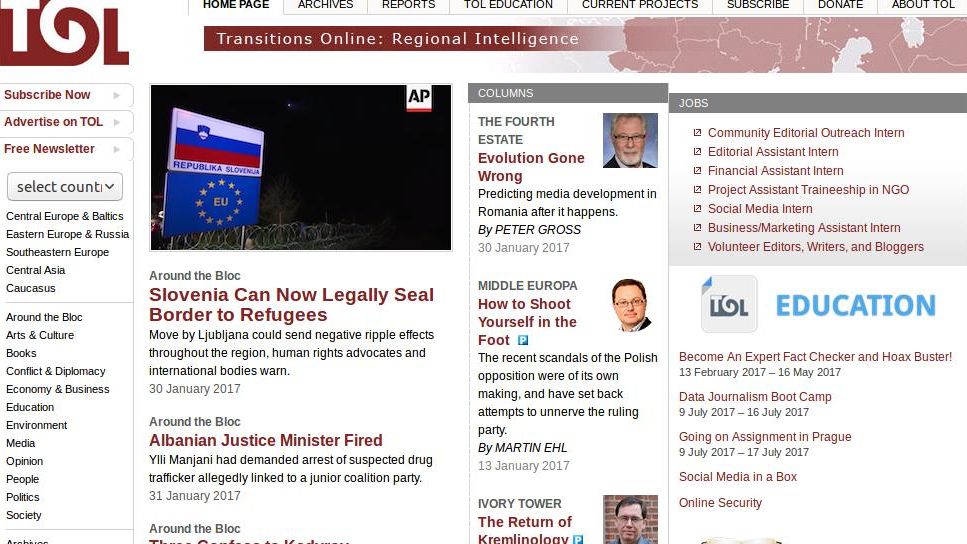
Around the Bloc: Tiny Estonia Spearheads Fight Against Human Rights Abuses
Estonia has become the first country in the EU to ban human rights violators from entering the country.
More...We kindly inform you that, as long as the subject affiliation of our 300.000+ articles is in progress, you might get unsufficient or no results on your third level or second level search. In this case, please broaden your search criteria.

Estonia has become the first country in the EU to ban human rights violators from entering the country.
More...
Christmas may never be the same again for millions of Central Europeans.
More...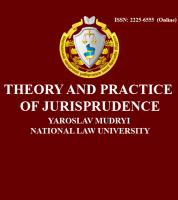
Problem setting. Development of financial and administrative relations is caused by the factors, the main ones are: 1) the reform of public administration system, 2) the reform of public finance system, 3) continuation of the process of filling with a new, more powerful meaning the legal status of man and citizen according to the Constitution of Ukraine.Recent research and publications analysis. The issues related to the administrative financial relations have been the focus of domestic scientists - specialists in administrative and financial law, among them V.B. Averyanov, Yu.P. Bytyak, V.M. Garashchuk, E.S. Dmitrenko, S.V. Kurinnyi, M.P. Kucheriavenko, V.K. Kolpakov, O.A. Lukashev, V.Ya. Nastyuk, O.P. Ryabchenko, O.O. Semchyk, O.I. Kharitonova and others.Paper objective. Legal relations in the field of administration of public finance.Paper main body. Public finance depending on its origin is classified into the following types: 1) public finance of European and world institutions attracted to use inUkraine; 2) the public finance of the state and territorial communities; 3) the finances of other corporate members of society, which ensure public needs.Administration of public finances is interdisciplinary in nature, and financial-administrative relations are regulated by rules of public law (rules of both financial and administrative, constitutional law).The financial and administrative relations – are regulated by rules of public law, public relations, that emerge, change and terminate during the mobilization, allocation and use of public finance, they have public and imperious character and ensure the public needs of society, its individual social groups and members, state and local communities whose satisfaction requires adequate financial resources.The financial and administrative relations, like any other jural relationships, have its structure, the elements of which are: 1) the subject; 2) the object; 3) the legal and factual content.Conclusions of the research. Given the current realities it is expedient to highlight the following important characteristics of the financial and administrative relations: a) they arise in the sphere of administration of public finance; b) they have as a compulsory subject public authorities, representing public and legal interest, acting on behalf of the state, a territorial community or a certain part of society and implementing its administrative competence c) they are characterized by relations of power and subordination and legal inequality of the parties; d) they arise to solve financial issues in order to meet common generalized public needs of society and its individual social groups and members, the state and local communities; d) they ensure organizing influence of public administration on public finance; e) they differ by special legal regime of ensuring legality and legal protection (combination of state functions with the interests and rights of citizens, non-governmental collective subjects and local communities); g) they are divided into two levels: supranational and national.
More...
Formulation of the problem and actuality of theme. All the innovations that occur at the legislative level, require study and analysis to ensure the correct implementation of the relevant provisions in practice, especially given the ambiguity of the legal practice which has developed in the land legislation. So now there are many frequent cases when the same legal rules are applied differently in consideration of similar issues. This, in turn, encourages specialists to search for optimal solutions for solving contentious issues with the further distribution of proved options. The most problematic issue under present conditions is the realization of powers of local government in land management.Analysis of recent of researches and publications. The theoretical basis of this research consists of works of legal scholars: V.I. Andreytsev, V.P. Balezin, Yu.O. Vovk, B.V. Erofeev, I.I. Karakash, N.V. Krasnov, P.F. Kulinich, A.M. Miroshnychenko, V.V. Nosik, Yu.S. Shemshuchenko and others.The purpose of the article is a comprehensive analysis of the legislation on enlargement of the powers of local government in land relations.The main material. NowadaysUkraine is in the process of the administrative reform of decentralization. Establishing of such a rule was caused by a number of economic and political conditions for the establishment of stable and effective system of public administration in Ukraine as a whole and at all levels of administrative and territorial structure of the state.The essence of the decentralization is to transfer of significant powers and budgets of state agencies to local governments. The process of decentralization of power has not gone round the regulation of division of powers on land issues, in particular relations of possession, use and disposition of land.The process of transfer of power to the local places and implementation of the wide structure of executive power at the local level are provided. Several draft laws are registered in the parliament today. According to them powers of local government can be significantly expanded in the future including in the sphere of land relations.Conclusions. At present the powers of local governments in land relations has been greatly expanded on the legislative level. Nevertheless, these changes only initiate the implementation of the Concept of reform. They need to be continued and implemented by consolidating and amending the current legislation. According to the concept reformation of management in the sphere of land relations the main authorities of management and provision of services in the sphere of land relations should become local governments, and by the state authorities will remain functions on generalization, monitoring of compliance with the law in the exercise of their powers by local authorities.
More...
Problem Setting. The implementation of biosphere reserves such tasks as: conservation of biological and landscape diversity, realization of the background ecological monitoring, studying of the natural environment, its changes under the influence of anthropogenic factors is possible only under condition of existence in the state a coherent, clearly defined control mechanism in the sphere of functioning and development of biosphere reserves. Effective public management in the conditions of free access of the public, research institutions and other subjects of management activity in this area is the key to preserving in natural state the most typical natural complexes of the biosphere, a harmonious combination of rational use of natural resources with their protection and reproduction.The actuality of the topic. The modern state of governance in the operation and development of biosphere reserves is studied in the article and the urgent need to further improve governance in this area is justified.It is established that a feature of administration in the sphere of functioning and development of biosphere reserves is in the fact that the subject structure of these relations is very diverse, as some of the players have managerial authority, although according to the law and their nature do not have authority regarding the implementation of regulatory impact. Therefore, it was proposed to classify management subjects in the field of functioning and development of biosphere reserves on the subjects of public administration and non-state control. In turn, the subjects of public administration should be attributed to entities of the general state administration in this area, for example, Ministry of Ecology and Natural Resources of Ukraine, and subjects of special public management, for example, the State environmental inspectorate of Ukraine. Non-state administration control there is a special administration of biosphere reserves and public inspectors.The purpose of the article. Despite the lack of specialized body of management of protected matter, proposed to create a single special authorized and isolated organ with clearly defined competence in the management of the NRF. In addition, it is proposed to improve the mechanism of state management by creating the appropriate territorial bodies, subordinate to the specified central body of executive power in the field of nature conservation to ensure implementation of state policy in the sphere of management of protected matter on places.Conclusions. The attention is focused on the need for the newly formed authority subordinate biosphere reserves, to resolve the inconsistencies between the different public authorities, enterprises, institutions, organizations in the formation and implementation of the strategy and development plans biosphere reserves. There was justified the opinion on improving the system of state management in the sphere of protection of biosphere reserves by the department of public service of protection of the NRF in an independent unit under the State environmental inspectorate of Ukraine, which is under the Ministry of ecology and natural resources of Ukraine.
More...
The problems of legal regulation of radioactive waste management in Ukraine. It is proposed to make some changes in the classification criteria for a specific activity and supplement it with a new category - very low level waste.
More...
The article presents issues related to the history of criminal law and the so-called legal archeology. In addition it shows their sources and their impact on the formation and development of legal culture in the Middle Ages on Polish land. The key issue is the evolution of the penalty and the emergence of the composition system (łac. compositio), in which there have to reach a settlement between the perpetrator of the murder and the victim’s family (relatives). Element of the agreement was imposed on the perpetrator of the murder of an obligation to build a stone cross or chapel. These elements - crosses and shrines - had an expiatory character. Therefore they are commonly known as penitential crosses and shrines. There is several hundred of these stone witnesses of the medieval criminal justice in Poland.
More...
In light of the conference theme this academic paper deals with the issue of legal protection of consumers in the digital society. The authors describe the concept of a typical consumer to whom legal protection is provided by the legal framework as a standard and compare it with the new concept of an “average consumer “ that has been established by case law of the European Court of Justice. Special attention is paid to assessment of an “average consumer” in the context of the internet (in the era of a digital society) and the fact that several court decisions issued in the Slovak and Czech Republics have granted higher legal protection to the internet’s “average consumer” than to the “average consumer” in other areas of legal relations (for example, bricks-and-mortar shopping).
More...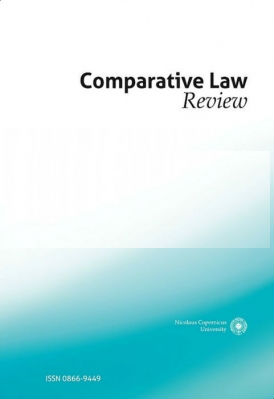
Rafał Szczepaniak generally agrees with the ideas expressed by some contemporary lawyers that the division of the legal system into public and private law is multifunctional and dependent on a wide variety of contexts, and that it is a non-dichotomous division. Although, according to Rafał Szczepaniak, the idea of non-dichotomous division is not particularly revealing as one can encounter similar statements in European jurisprudence made throughout the twentieth century, the merit of the above-mentioned lawyers is to draw attention to the momentous consequences of this idea, including in the sphere of human rights the protection of human rights against the undue interference of the state and that of other public bodies. The main thesis of the present article can be summarized by the assertion that the non-dichotomous division into public and private law has a significant impact on the outcome of the rulings of courts. The author draws examples from cases heard in Polish courts since for obvious reasons Polish legal practice is that best known to him. At the same time the Polish examples presented in the article prove that the distinction between public and private law is of universal importance regardless of whether we take into consideration the Polish legal system or the legal systems of the other European countries.In conclusion, the author formulates the postulate de lege ferenda to distinguish a subset of private law regulating the activity of the administration.
More...
This article explains the concept of piercing the corporate veil doctrine which is widely recognised in common law countries. Generally, the doctrine allows the extension of liability for a company’s debts to shareholders and officers, if any kind of fraud or unfairness is involved. This dissertation focuses on differences between American and British attitudes towards the doctrine and analyses the grounds for the what is known as “judicial piercing” and “statutory piercing”. Nevertheless, the main purpose of this paper is to answer the question of whether the piercing doctrine can be applied to the Polish legal system. Officially, it has never been recognised by Polish jurisprudence and courts. However, in-depth research on that issue can provide really surprising results. It seems that current statutory measures in Poland can extend the liability of a company towards officers, directors etc. and can easily be compared with “statutory piercing”. The article also touches on the problem of shareholders’ tort liability under Polish law. Furthermore, the article sheds light on the new Polish Insolvency Act and its consequences for the concept of corporate liability as well as the “Amber Gold” case, one of the biggest financial scandals in Poland for many years.
More...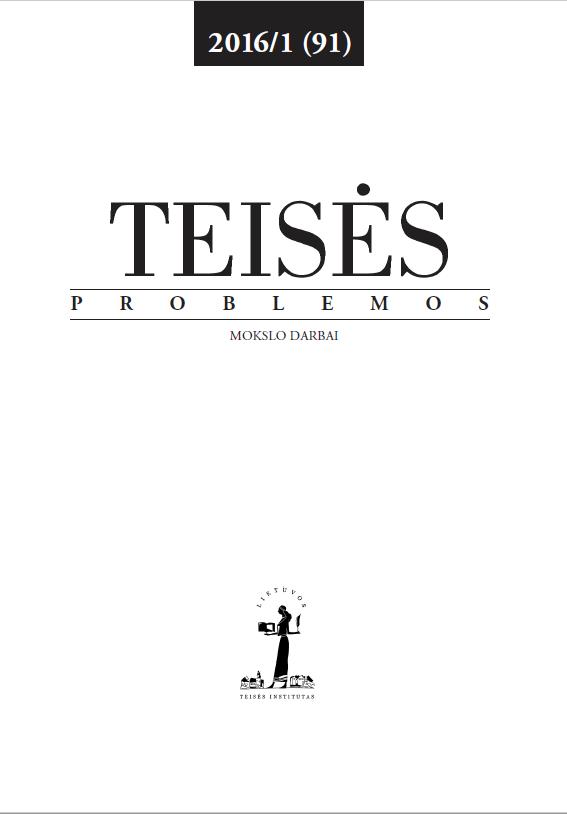
According to Article 8 of the European Convention on Human Rights, everyone has the right to respect for his private and family life, his home and his correspondence. The High Contracting Parties shall secure the right to privacy within their jurisdiction and have positive obligations to ensure the respect and effectiveness of the protection of this right. Criminal law is one of the legal instruments (others are civil, administrative or ethical liabilities) to guarantee an adequate level of privacy protection in the national legal systems of The High Contracting Parties. The article analyses most serious violations of privacy, which are criminal offences according to the Lithuanian Penal Code. It should be noted that national law in this sphere is closely related to the particular State’s obligations under the Convention. Therefore, actual case law of Lithuanian courts was analysed in the light of the case law of the European Court of Human Rights. The main aim of this article is to deepen the theoretical knowledge on the right of privacy in the context of criminal liability according to Lithuanian law.
More...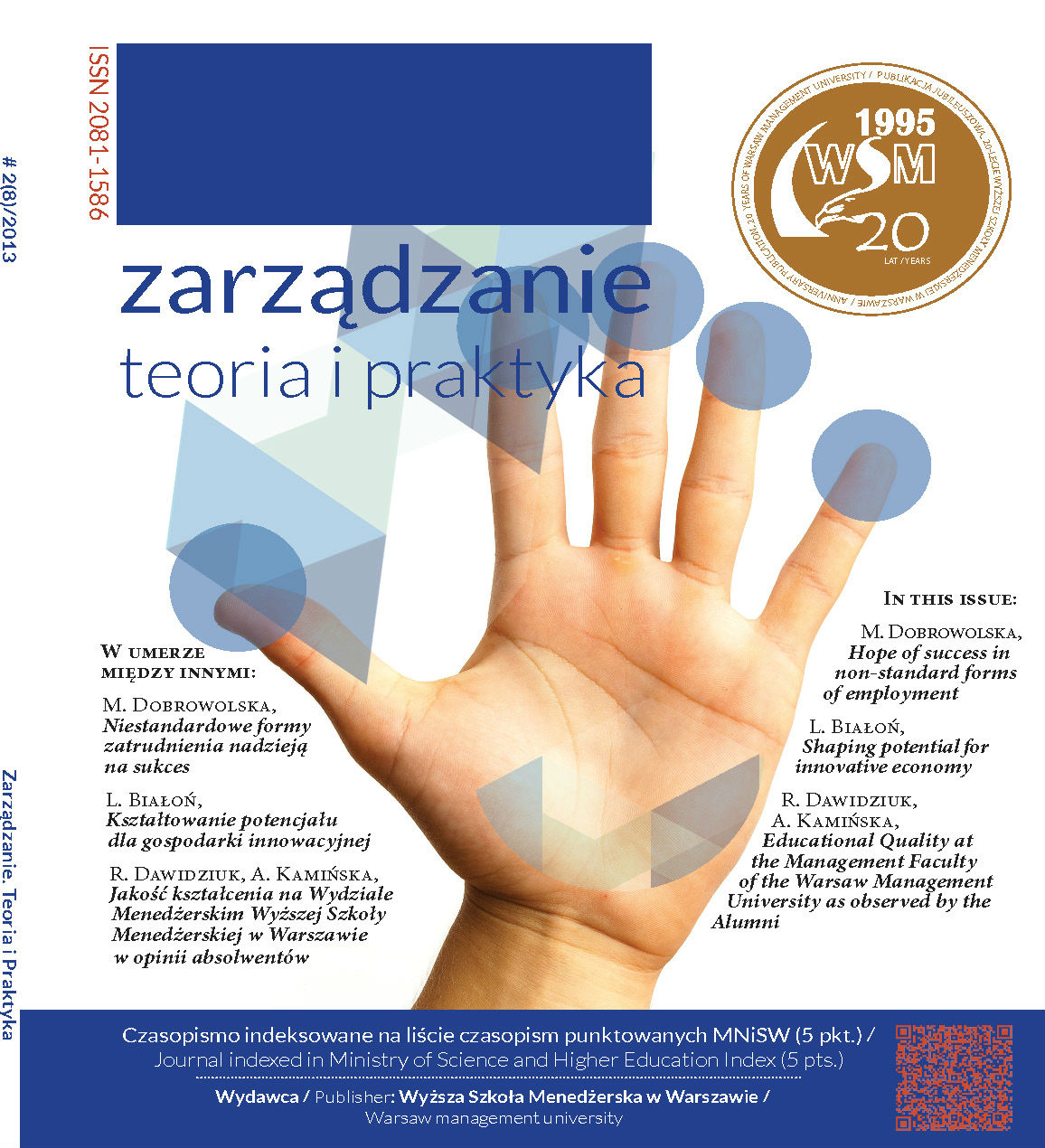
W artykule Autor stwierdza, że dotychczasowe określenie pojęcia „własność intelektualna” nie oddaje w pełni jego znaczenia, a dotyczy i definiuje pojęcie „ochrona własności intelektualnej”. Poprzez analizę zapisów prawnych w artykule - w postaci modelowej zaproponowano własną definicję pojęcia własności intelektualnej przedstawiono trójkę pojęciową opisującą istotę elementu. Dodatkowo podkreślając że własność intelektualną można przypisać jednostce, jako jej kapitał osobisty tylko wtedy, gdy dany desygnat będzie posiadał cechę indywidualnej nowości.
More...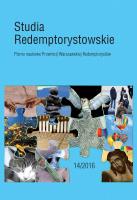
Legislation is widely recognized as an art. The art requires not only the knowledge about a legal system or the legislative techniques. The legislator must also have substantive knowledge about the reality to be regulated. The remark concerns also canon law and Church legislator. The question that can be raised in this context can be formulated as follows: Does a Church legislator need to have any knowledge of doctrine, worship, customs and law of non-Christian religions? The paper presents some areas of law where the knowledge in question can be of help to legislator when he is fulfilling his duty. They are, e.g., matrimonial law, penal law, legal proceedings, international law. The final answer for the research issue is that a Church legislator must know, first of all, the catholic religion. The knowledge of non-Christian religions is not essential for him. Although it can be useful for him in a very limited range.
More...
In an era in which the use of the means of social communication is very common there is also the increase of the risk of its potential abuse. Everyone in the light of the can.11 of the Code of Canon Law who is governed by a Church must be aware of this. One frequently occuring offenses in the use of the media has become a blasphemy that under canon law is a delict, as in opposition to the Code from 1917, the existing legislation clearly defines in the can. 1369 of the Code of Canon Law. To the existence delict within the meaning of this norm the criminal behaviour must rely on showing own thought in public with the clear intention of insulting God, saints or objects and places of worship. The public commission of delict of the blasphemy by means of social communication may further seriously offend the religious feelings of a large group of faithful who become the recipients. It is also possible to perform with the detriment of religious sensitivities of others by inciting to evil. However blasphemy cannot be easily identified with the crime offending religious feelings. Punishing the blasphemers, by using the obligatory but not specified just penalty, is to protect the Church as a community of faith and good which is the faith of its individual members.
More...
Pope Francis, considering the most important law of the Church salus animarum suprema lex, reformed the process of the declaration of nullity of marriage. The stimulus for undertaking work on changing the previous procedure was the ever-increasing number of the faithful, who, due to moral or physical remoteness from the Church, can not fully participate in the redemptive grace of Christ. The motu proprio Mitis Iudex Dominus Iesus, which makes changes to procedural matrimonial law, consists of seven basic objectives relating to canon law. They were expressed in the following way: 1) one judgement establishing nullity is enforcable; 2) single judge under the responsibility of a bishop; 3) the bishop is himself a judge; 4) abbreviated process; 5) an appeal to the Metropolitan Capital; 6) the own duty of the Bishops’ Conference; 7) an appeal to the Holy See. Bear in mind that Pope Francis’s reform does not make changes to substantive matrimonial law. The Church still upholds the unity and inseparabilty of the marriage ties. The changes concerning the marriage procedure are aimed at the acceleration and improvement of passing judgements in processes concerning the declaration of nullity of marriage. However, the obtaining of moral certainty by a judge during issuing a sentence still remains the guiding principle.
More...
The migration movement, growing under the influence of globalization, constantly brings about new problems and challenges. Free movement of technology, increasing awareness of fundamental human rights, the demographic situation, the economic difficulties, unjust distribution of material goods, persecution because of political and religious beliefs and tribal fights are just some of the factors that compel a man to leave his own homeland and ethnic community, and that shape the face of modern migration. From the perspective of the basic norms of canonical law, which is the suprema lex as salus animarum (CIC c. 1752) the ratio of canonical and pastoral care for the people on the road has to be derived from the Mystery of Epiphany and, as confirmed in the 2013 Pontifical council statement: „The adoption of Christ in the refugees and expellees”, the most important point of reference in troubleshooting the problems of newcomers cannot be the interest of the state or national security, but only a man and his salvation.
More...
Informally national bishops’ conferences existed already in the 19th century. The benefits of organizing such conferences were slowly becoming more and more apparent, as they allowed bishops to share their experiences. At the request of bishops, the Holy See sometimes accepted the statutes of various national conferences – at that time, the law of the universal Church did not contain any norms that regulated the organization and functioning of such institutions. The situation changed during the Second Vatican Council, when the need was recognized to legally regulate the existence and functioning such conferences. The first version of the Statutes of the Polish Episcopal Conference was passed on February 13, 1969, and after a month, on March 15, it gained recognitio of the Holy See. Thus, the Polish Episcopal Conference officially became a subject of ecclesiastical law. The article describes transparency and restrictions on activities of the Polish Episcopal Conference based on subsequent versions of the Statutes and Regulations and on activities of the major bodies of the Polish Episcopal Conference.
More...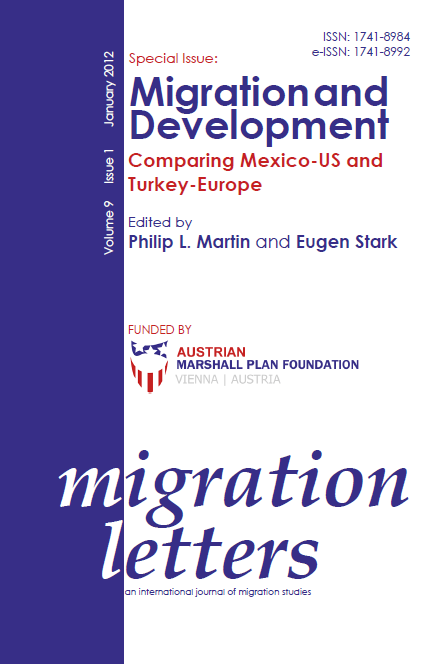
This study examines the causal factors to explain the different integration pat-terns of the Turkish community in the Netherlands and Germany. The Dutch and German Turkish communities offer an excellent opportunity for compara-tive analysis of integration, since they share many socio-cultural characteristics but differ in their level of integration. It suggests that the Turkish immigrants in the Netherlands are more integrated into the host society than their coun-terparts in Germany due to the difference in “macro-environmental factors” such as the political-legal framework and economic factors in these countries. These factors can stimulate or constrain the integration of ethnic groups. While anti-ethnic legislation, unfavourable immigration policies and discrimi-nation in the labour market discourage integration, anti-discrimination laws and easy naturalization promote integration of immigrant communities into host societies.
More...
In fast allen europäischen Ländern ist die paulianische Anfechtungsklage (actio Pauliana) ein Korrekturmittel, dazu geschaffen, den ursprünglichen Zustand wiederherzustellen und Gläubigerbenachteiligung zu beseitigen. Das ist eine Ausnahme von der Regel, dass der Schuldner die Freiheit in Verfügungen über sein Vermögen hat. Als Hauptziel der actio Pauliana wird der Gläubigerschutz vor Schuldnerzahlungsunfähigkeit dargestellt. Das deutsche Anfechtungsgesetz und das polnische Zivilgesetzbuch regeln sowohl objektive als auch subjektive Voraussetzungen der Anfechtung. Wenn es um objektive Voraussetzungen in diesen zwei Rechtsystemen geht, sind die Ähnlichkeiten weitgreifend. Andererseits kann die vergleichende Analyse zur Stellung von Postulaten führen, wie die Klage im polnischen Recht effektiver funktionieren könnte. Beispielsweise schützt das Anfechtungsgesetz den Gläubiger vor Rechtshandlungen. Dieser Begriff hat eine breitere Bedeutung als das polnische „Rechtsgeschäft“ und erweitert positiv den Anwendungsbereich von actio Pauliana in Deutschland.
More...
Der vorliegende Beitrag befasst sich mit der Ausgestaltung der haftungsrechtlichen Verantwortung des Staates für unerlaubte Handlungen von Polizeibeamten in Deutschland. Schwerpunktmäßig wird auf die jeweiligen Tatbestandsvoraussetzungen des zentralen Amtshaftungsanspruchs (§ 839 BGB) eingegangen. Es wird der Versuch unternommen, die zuweilen unübersichtliche Kasuistik anhand von strukturellen Erwägungen zu ordnen und damit dem Leser auch den Wirkungskreis der jeweiligen Tatbestandsmerkmale im Einzelnen sowie der Anspruchsnorm im Ganzen aufzuzeigen. Ferner werden nicht abschließend weitere bundes- und landesrechtliche Haftungsnormen behandelt und Regressansprüche des Staates gegenüber seinen Polizeibediensteten untersucht. Letztlich werden die Forschungsergebnisse in einer rechtsvergleichenden Schlussbetrachtung den polnischen Regelungen gegenübergestellt.
More...